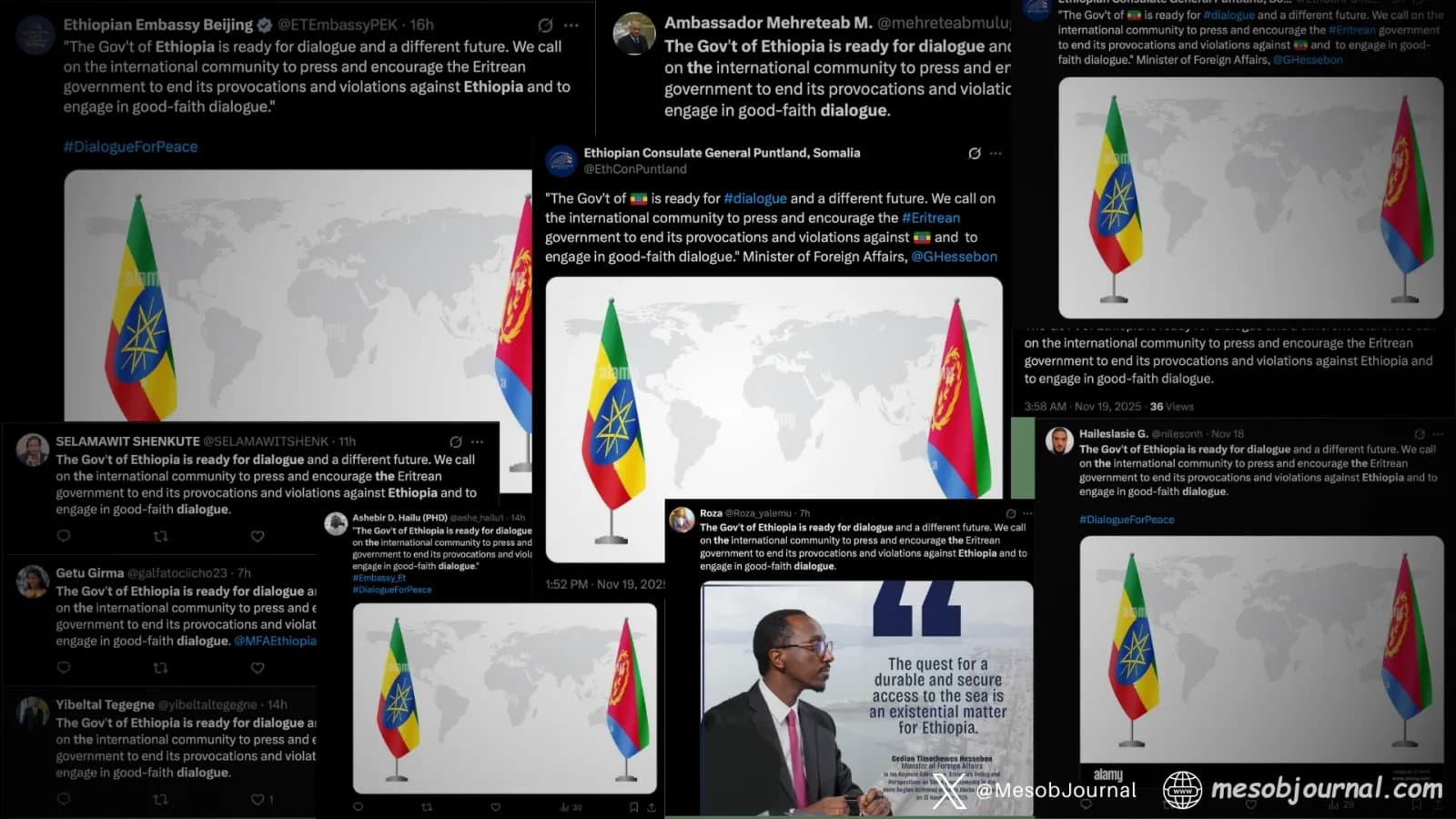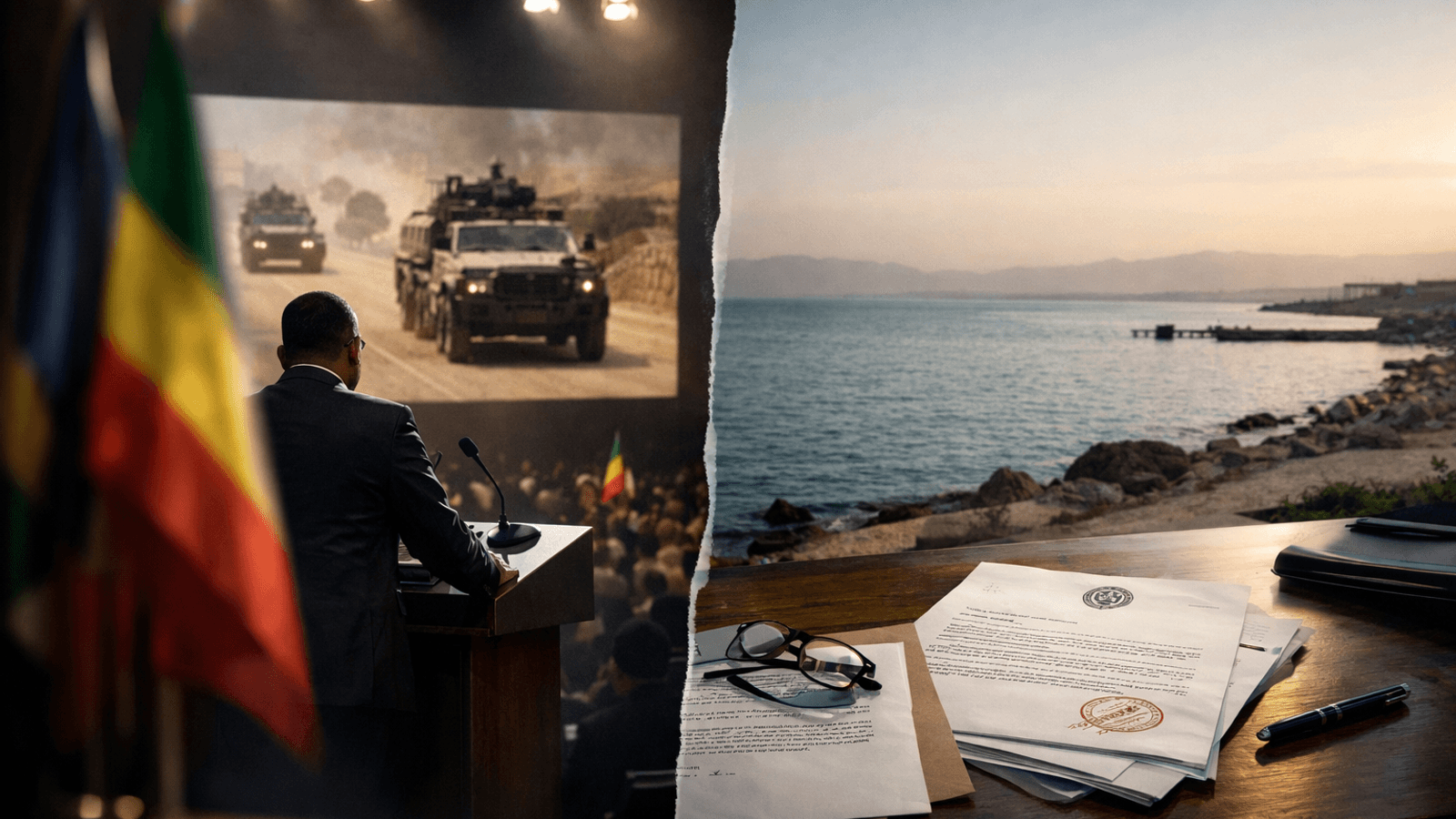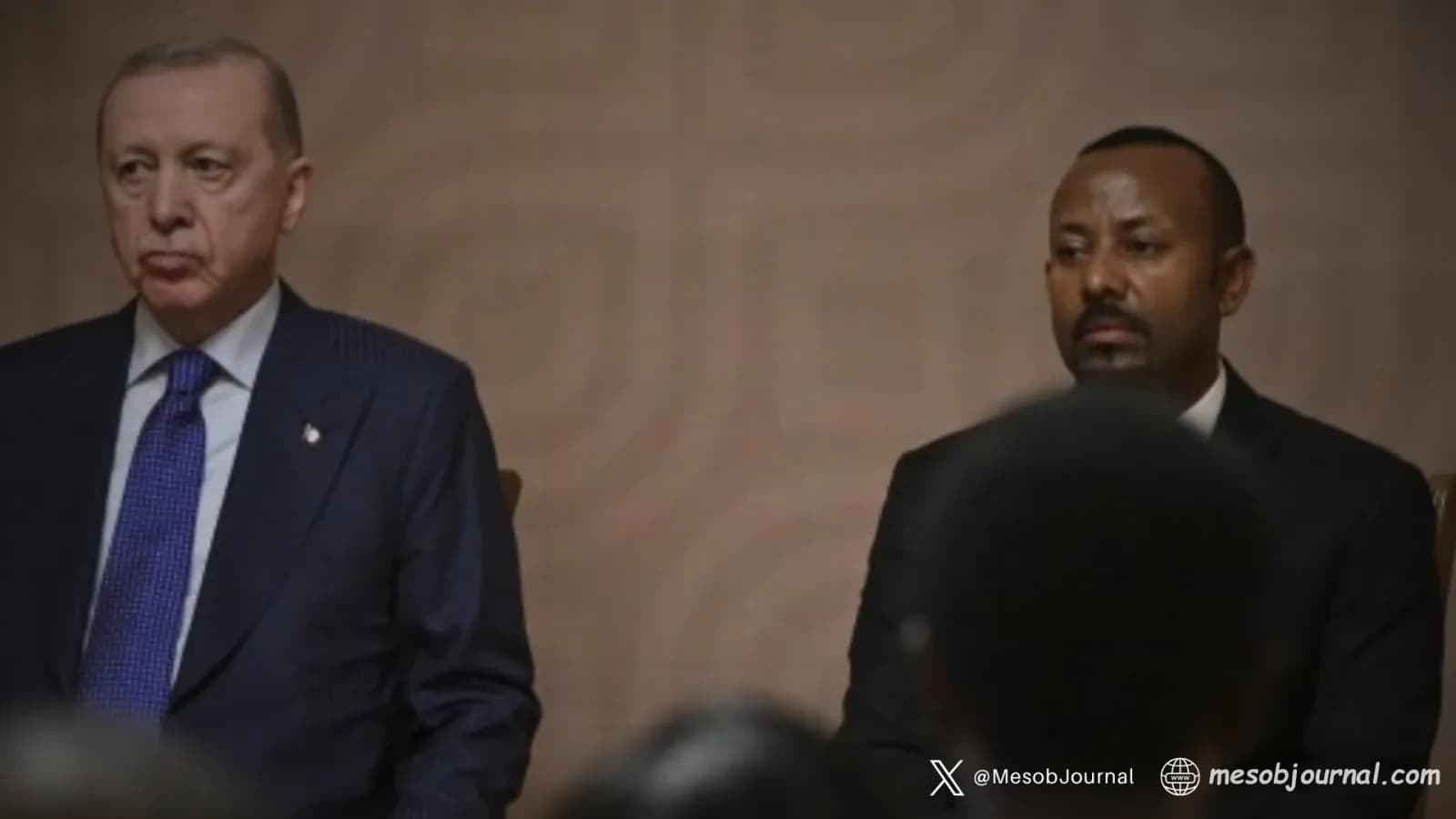Copy-Paste Diplomacy: Ethiopia’s ‘Dialogue’ Campaign on Eritrea

Within a few hours this week, a nearly identical paragraph began marching across Ethiopian state-linked accounts on X and Facebook.
From the Ethiopian Embassy in Tokyo to embassy pages in Beijing and other missions, from MFA-adjacent pages to partisan activists, the same text appeared:
“The Gov’t of Ethiopia is ready for dialogue and a different future. We call on the international community to press and encourage the Eritrean government to end its provocations and violations against Ethiopia and to engage in good-faith dialogue.”
It looked less like spontaneous diplomacy and more like a hymn sheet being distributed from the center.
What we are seeing is not a genuine policy shift, but a copy-paste campaign designed to launder an old war narrative into a new victim script – and to pin the burden of “peace” on Eritrea, while Addis Ababa keeps its options open for escalation.
The hymn: one paragraph, many mouths
Traces of the operation are easy to follow.
The same paragraph, sometimes word-for-word, was pushed by Ethiopian embassies, including in Tokyo and Beijing, on their social channels. The wording also turns up in embassy graphics about “sea access” and in posts amplifying Foreign Minister Gedion Timothewos’s recent speeches.
Supporters and aligned activists then recycled the exact text or screenshots of those posts on their own accounts, presenting it as fresh commentary rather than a centrally crafted line.
This is not how sovereign diplomacy normally works. States issue notes, statements, or communiqués. They don’t usually blast one emotionally loaded paragraph across embassies and partisan networks in a synchronized wave – unless the real goal is narrative management rather than negotiation.
The template itself is telling. It does three things at once:
- Self-absolution: casts “the Gov’t of Ethiopia” as ready for dialogue and “a different future,” with no reference to its own two-year campaign of threats over “sovereign sea access.”
- Externalization of blame: frames Eritrea as the sole source of “provocations and violations” that must be made to stop.
- Internationalizing pressure: directly invites foreign capitals to “press and encourage” Eritrea – in effect, to adopt Addis Ababa’s framing and help box Eritrea into defensive diplomacy.
It is a ready-made talking point for diplomats, analysts, and sympathetic media who want a simple storyline: Ethiopia is calm, Eritrea is reckless, the “international community” must act.
From war manifesto to victim script
This hymn campaign did not appear in a vacuum. Its roots lie in recent speeches by Foreign Minister Gedion Timothewos and the broader sea-access doctrine pushed by the Prosperity Party (PP).
At a Foreign Policy Forum in Addis Ababa, co-hosted with Horn Review and Addis Ababa University, Gedion once again elevated Ethiopia’s “need for access to the sea” from an economic issue to an “existential” and security matter.
In the same speech and related write-ups, he:
- Accused Eritrea of controlling “local administration units” inside Ethiopia and of materially supporting armed groups,
- Claimed these allegations provide grounds for Ethiopia’s “legitimate exercise” of self-defense,
- Repackaged the long-running Red Sea agenda – including the push for Assab – as a matter of correcting historical injustice, not expansionism.
Linked embassy posts amplified this line, stating that Ethiopia’s need for sea access is “an existential necessity,” and folding that claim into the same “ready for dialogue” formula now being mass-distributed.
So the pipeline is clear:
- Stage 1 – Doctrine: present sea access as existential, recast coercive options as “self-defense,” and place the blame for instability squarely on Eritrea.
- Stage 2 – Sanitization: package this doctrine in English-language legalese for foreign think tanks and diplomatic forums.
- Stage 3 – Hymn campaign: roll out a uniform “dialogue” paragraph through embassies and supporters to claim the moral high ground and shift pressure onto Eritrea.
Calling it a peace initiative ignores the obvious: the “call for dialogue” is built squarely on a prior narrative that justifies confrontation and openly treats Eritrea’s sovereignty as negotiable.
Two languages, two audiences
Eritrea’s Minister of Information, Yemane G. Meskel, captured this contradiction in a post on X on 18 November, describing the “double-speak and duplicity” of the Prosperity Party leadership.
He pointed out that:
- In English, the Foreign Minister re-packaged Ethiopia’s two-year saber-rattling over “sovereign access to the sea” into the language of self-defense and legal rights.
- Just a day later, a senior Ethiopian general, speaking in Amharic to domestic audiences, appealed to armed groups to give the army “a respite” as they prepared for a “larger mission.”
That contrast – legal briefs abroad, mobilization hints at home – is exactly what makes the current hymn campaign so alarming.
You cannot credibly ask the world to “press Eritrea” into dialogue while your own security establishment talks about gearing up for a bigger operation, and your foreign minister has spent months framing the Red Sea issue as a national security emergency and historic injustice to be “rectified.” And by the way — what dialogue, exactly? Dialogue for what? For silence? For Eritrea to accept a script already written in Addis Ababa?
Yet this is the formula:
- To foreign diplomats: We are responsible, they are provocative. Help us.
- To domestic audiences: We are wronged, we must correct history, bigger missions are coming.
What’s unfolding here is narrative warfare, pure and simple.
Blame Eritrea, recruit the world
The core target of this campaign is not Eritrea alone. It is the perception of Eritrea in foreign capitals.
By saturating official channels with the same “ready for dialogue” paragraph, Addis Ababa is trying to lock in three assumptions among external actors:
- Ethiopia is the adult in the room – always willing to talk, always framed as seeking a “different future.”
- Eritrea is the spoiler – the party of “provocations and violations” that must be convinced or coerced into good behavior.
- The international community is a lever – a tool that can be enlisted to amplify Ethiopian pressure, whether through public statements, quiet demarches, or aid-linked nudges.
It is not an accident that this push follows a wave of coverage and commentary highlighting Ethiopia’s expansionist rhetoric on sea access, including references to “existential necessity” and the strategic imperative of Assab. Nor is it a coincidence that independent Eritrean and regional voices have been documenting this pattern and describing the new “dialogue” talk as a political maneuver.
In other words: the more the old war manifesto is exposed, the more Addis Ababa needs a fresh coat of diplomatic paint.
Copy-paste diplomacy as a symptom
There is something else the hymn campaign reveals: weakness.
Strong, confident diplomacy does not need templated talking points blasted across embassies. It does not rely on identical Facebook captions, synchronized X posts, and graphics reusing the same slogans. It certainly doesn’t pivot overnight from threatening force for “sovereign sea access” to pleading for international pressure on a neighbor, without ever acknowledging that earlier rhetoric.
Copy-paste diplomacy is the behavior of a political machine that:
- Is under domestic strain,
- Feels it is losing the narrative internationally, and
- Hopes that repetition can substitute for credibility.
The Prosperity Party’s information strategy toward Eritrea has followed this arc for two years: escalation, gaslighting, and now a campaign to invert victim and aggressor. The latest hymn is simply the most choreographed version so far.
The Consequences of a Manufactured Crisis
For Eritrea, the substance is clear and unchanged:
- Eritrea is within its borders and has not threatened Ethiopia’s sovereignty.
- Sea access for Ethiopia – as Eritrea has repeatedly said – is a matter for peaceful, lawful commercial arrangements, not a pretext to rewrite borders or downgrade Eritrean independence.
What is new is the attempt to mobilize third parties to pressure Eritrea under the banner of “dialogue.”
For the wider Horn of Africa, this matters because these narratives often precede policy. When a government spends years telling its public that it faces an existential injustice, that a neighbor is obstructing history, and that self-defense justifies extraordinary measures – and then suddenly launches a global “press them to dialogue” campaign – it is not de-escalating. It is setting the stage.
Eritrea’s Information Ministry has chosen to call this out directly, naming the double-speak and warning that the same officials who talk of self-defense abroad are preparing “larger missions” at home.
The task for serious observers is simple: refuse to be hypnotized by copy-paste diplomacy.
Judge Ethiopia’s intentions not by viral embassy posts, but by the full record: the speeches that frame sea access as existential, the generals talking of bigger missions, the think-tank op-eds depicting Assab as a strategic imperative “not an option,” and the tightly coordinated hymn demanding that the world “press” Eritrea to accept a dialogue scripted in Addis Ababa.
Once all those pieces sit side by side, the picture is hard to miss.
This is not a peace offer. It’s an operation built to confuse in order to convince.
Related stories

Ethiopia: Abiy's War Script and the Media’s False Balance on Eritrea
The lazy framing is already being warmed up: “tensions are rising,” “neighbours trade claims,” “both sides must de-escalate.” It sounds responsible. It reads balanced. And it quietly deletes the one fact that matters: one side has spent years normalising war talk as policy. If y

Erdogan in Addis: sovereignty first as Abiy beats sea-access drum
Abiy Ahmed tried to stage the usual Addis photo-op when Turkey’s President Recep Tayyip Erdoğan arrived. But the camera caught something different: a stiff, guarded prime minister sitting beside a visitor who didn’t look like he came for flattery. What played out at the joint app

AU PSC: Israel’s Somaliland move “null and void”
The African Union Peace and Security Council (PSC) has issued one of its clearest sovereignty statements on Somalia in years—explicitly condemning Israel’s unilateral recognition of the “so-called Republic of Somaliland,” demanding it be revoked, and warning that no actor has the

Eritrea Dismisses Ethiopia’s Letter, Cites Two-Year Hostile Campaign
Eritrea’s Ministry of Information has dismissed Ethiopia’s latest diplomatic message as “patently false and fabricated,” rejecting what it described as a familiar two-year pattern of hostile campaigns — and pointedly refusing to be pulled into public escalation. In a short press

